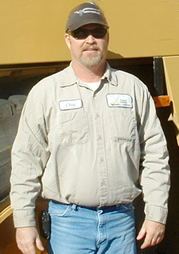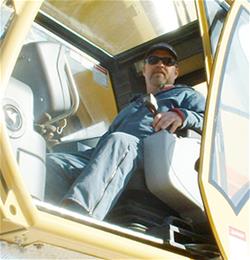CCO Operator Profiles - Charles “Chip” Grant
 Charles “Chip” Grant is a third-generation crane operator and a two-time CCO mobile crane operator recertificant. Chip has been around cranes his whole life; his grandfather was an operator, and his father established a crane and rigging business by purchasing his first crane when Chip was seven. In addition to his Telescopic Boom Crane—Fixed Cab (TSS) and Telescopic Boom Crane—Swing Cab (TLL) mobile crane operator certifications, Chip has also achieved his signalperson CCO certification. He has served as an NCCCO Practical Examiner since 2006. He is currently working toward getting his rigger certification.
Charles “Chip” Grant is a third-generation crane operator and a two-time CCO mobile crane operator recertificant. Chip has been around cranes his whole life; his grandfather was an operator, and his father established a crane and rigging business by purchasing his first crane when Chip was seven. In addition to his Telescopic Boom Crane—Fixed Cab (TSS) and Telescopic Boom Crane—Swing Cab (TLL) mobile crane operator certifications, Chip has also achieved his signalperson CCO certification. He has served as an NCCCO Practical Examiner since 2006. He is currently working toward getting his rigger certification.
As one of the first operators to become CCO certified, Chip is due to recertify for the third time later this year. He sees the recertification process as an excellent way to stay up to date on the latest information and keep everything fresh in his mind. He’s found that having his CCO certification carries with it significant respect and authority on the jobsite; if he’s asked to do something that’s not safe, he can use what he’s learned in earning his CCO certification to explain why not to do it that way and can present alternative solutions.
While Chip learned to operate cranes on the job working with his father, he’s been employed by Tempe Crane (Tempe, AZ) since 1993. From NCCCO’s early days, Tempe Crane has been a strong supporter of operator certification. The company holds quarterly safety and training meetings, and Chip helps both train employees in new skills and then administer the appropriate CCO certification exams.
Noting that in his part of the country almost all contractors require CCO certification and everyone in his company is on board with NCCCO’s mission to improve crane safety, he says his company’s policy has helped it stay busy during otherwise slow periods. For example, over the past year Chip and Tempe Crane have helped construct a new training facility for the Arizona Diamondbacks and Colorado Rockies. The general contractor for the project, Mortenson Construction, is known for its emphasis on safety, so it insisted that its subcontractors be CCO certified. Tempe Crane’s well-known endorsement and use of CCO certification for its employees therefore played a large part in the company getting the job and keeping two or three cranes and five or six people busy all summer long.
 Chip sees the new OSHA rules as potentially helpful because of their clear assignment of responsibilities at a job site. Too often, he says, he shows up at a job site that hasn’t been properly prepared. For example, in his area of the country he often sees huge 20+ foot drainage pipes covered by only a couple of feet of soil; hidden from view, they can present a serious danger when setting up cranes. The new OSHA requirement for contractors to disclose ground conditions should directly improve crane setup and safety, he says.
Chip sees the new OSHA rules as potentially helpful because of their clear assignment of responsibilities at a job site. Too often, he says, he shows up at a job site that hasn’t been properly prepared. For example, in his area of the country he often sees huge 20+ foot drainage pipes covered by only a couple of feet of soil; hidden from view, they can present a serious danger when setting up cranes. The new OSHA requirement for contractors to disclose ground conditions should directly improve crane setup and safety, he says.
With Arizona’s warm temperatures year-round, much of Tempe Crane’s business involves placing large HVAC and chiller units on commercial buildings. But over the years, Chip has tackled many other difficult jobs. Among the most challenging was constructing prefabricated government buildings made up of 50,000+ pound components on top of Arizona and California mountains. “First you have to get the crane up to the top of the mountain and find somewhere to set it up, and that can be quite a challenge in itself,” he notes. He’s also helped on some large landscaping jobs moving big trees weighing close to 15,000 pounds. “People around here don’t want to wait for the trees to grow, so we end up moving fully grown trees,” he says.
These days, Chip splits his time between operating cranes, training employees, administering CCO exams, selling Tempe Crane’s services, and keeping the customer satisfied. In addition to breaking up his day, he says, “It’s much easier on my back this way.”